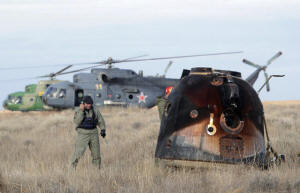|
Multinational crew leaves space station,
returns to Earth
 Send a link to a friend
Send a link to a friend
 [October 31, 2016]
By Irene Klotz [October 31, 2016]
By Irene Klotz
CAPE CANAVERAL, Fla. (Reuters) - A joint
U.S., Russian and Japanese crew left the International Space Station on
Saturday aboard a Russian Soyuz capsule and landed back on Earth,
leaving behind three crew mates who arrived at the orbiting outpost just
last week.
Station commander Anatoly Ivanishin, with the Russian space agency, NASA
astronaut Kate Rubins and Japan’s Takuya Onishi climbed inside the
capsule and left the station at 8:35 p.m. EDT, a NASA TV broadcast
showed.
The trio made a parachute landing in Kazakhstan at 11:58 p.m. EDT,
wrapping up a four-month mission that included the first use of a DNA
sequencer in space and installation of a parking spot for upcoming
commercial space taxis.
"I'm kind of reluctant to close the hatch," Ivanishin said during a
change-of-command ceremony on Friday.
"The time is very special here ... I didn't have time to know what’s
going on our planet, and maybe it’s for the better. On the space
station, you live in a very friendly, very good environment."

Ivanishin turned over command of the space station, a $100 billion
orbiting research lab, to newly arrived U.S. astronaut Shane Kimbrough.
Kimbrough and Russian cosmonauts Sergey Ryzhikov and Andrey Borisenko
reached the outpost on Oct. 21.
"We’re sorry we’re only here a week with you," Kimbrough told the
departing crew after taking command on Friday. "You guys have trained us
well though."
[to top of second column] |

A Russian Soyuz MS space capsule stands on the ground shortly after
its landing with International Space Station (ISS) crew members Kate
Rubins of the U.S., Anatoly Ivanishin of Russia and Takuya Onishi of
Japan, as a rescue helicopter lands nearby, outside the town of
Dzhezkazgan (Zhezkazgan), Kazakhstan, October 30, 2016.
REUTERS/Dmitri Lovetsky/Pool

Kimbrough, Ryzhikov and Borisenko will be on their own until next
month, when another three crew members are due to reach the station,
a project of 15 nations that orbits about 250 miles (418 km) above
Earth.
(Editing by Steve Gorman, Nick Macfie and Sam Holmes)
[© 2016 Thomson Reuters. All rights
reserved.]
Copyright 2016 Reuters. All rights reserved. This material may not be published,
broadcast, rewritten or redistributed.
 |